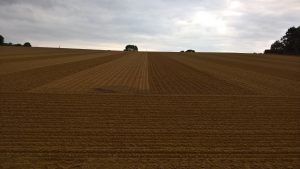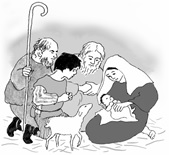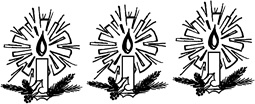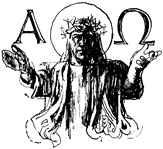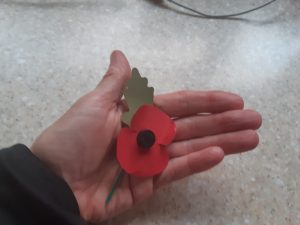Advent Sunday – 1 Thessalonians 3: 9-end, Luke 21: 25-36
The Advent course that we have been following this year has the title ‘So what are you waiting for?’. I wish that more of you had decided to join this, but realise that having the course on line – a decision reached with regret due to the high infection rates – may have put people off. I feel that the title is particularly appropriate for the season of Advent though, which is a time of waiting, although at times we don’t seem too sure what – or who – we are waiting for. In another parish, a friend of mine used to be increasingly annoyed with the vicar, who as he built up the crib scene for the children, which I think he did over a few weeks used the phrase ‘waiting for Jesus’. She felt that the children would become confused as the older ones would remember that we were waiting for Jesus last year too, until he came at Christmas, and now we were doing it all over again. It must seem confusing to a child, particularly as they are frequently very literal minded.
So – what are we waiting for? The western world is most definitely waiting for Christmas as your newspaper and television will not let you forget. I notice that the radio stations too are debating when it is appropriate to begin to play Christmas music. The consensus seems to be as soon as it is December, so be warned – it starts on Wednesday! Our readings for today – and for the rest of the season however seem to be looking much further ahead.
The many differences in tone between the two readings chosen for today makes you wonder why they were chosen for the same day. Paul speaks of the joy it brings him when he remembers the Thessalonian church, and how he often thanks God for them, and prays that they will be upheld and strengthened in their faith but he ends by praying that they will be ready when Christ returns, which is perhaps the main theme of Advent.
Jesus is warning the disciples – and us – of the alarming things that are to happen before his kingdom on this earth is finally and fully established. The reading today starts in the middle of the events that he is warning of, which begins in v8 of Luke 21, and much of it sounds like a description of the state of the world today. Many people believe that we are living now in the end times, and there have been lots of occasions when the time of Jesus return has been narrowed down to a date, and people have sold all they possess and headed for a place they believe to be appropriate to meet him. So far this has not happened – or at least not in the literal sense that they were expecting. I am sure you have seen pictures depicting Jesus descending on a sort of celestial elevator made of fluffy white cloud – somehow, I don’t think he was intending that description to be taken too literally. The fact is, we are in the same situation now as the people of Israel were before Jesus’ birth. We have hints in the prophesies, just as they had in the Old Testament, but very little that we can pin down with any accuracy. Perhaps that is why we have to have faith!
Before we look at the warnings that Jesus gives in the gospel reading, it is worth remembering that what He is telling us is that things will get worse before they get better, but that the dreadful things that are to come will only be temporary. In fact, the more I learn about history, the more I realise that He could have been describing almost any time between then and now. He has given us three fairly clear instructions about how we are too live through it all in this reading though.
Jesus first instruction to us, when we see these dreadful things that he has been talking about start to happen is not to do what my first instinct would be and find the nearest dark corner to curl up in and hide, but to stand tall and hold your head up. In this life we have nothing to fear, because, as St Paul tells us in Colossians chapter 3, we must set our minds on things that are above because we have died, and our life is now hidden with Christ in God. There may be times in this life when things get nasty and uncomfortable, but if we can think in terms of eternity, we have nothing to fear. And so we can, as Jesus tells us, stand tall, and whatever is coming, we can look it in the eye. As Jesus has said – it will not last for ever, but eternity with Him will.
Our second instruction is to be on our guard. We are told that we will not know the time that all this will happen, and that many people will get it wrong and cause panic and alarm by getting it wrong. In many of the parables Jesus likens the coming of the kingdom to things that are unexpected – like a thief in the night. Our job is to be wary, and where God has called us to do something, to make that our main focus. There is a story about St Francis of Assisi who was hoeing a row of beans when he was asked what he would do if he knew that this would be his last day on earth. His reply was that he would finish hoeing his beans. Sometimes we can feel that the place where God has put us and the task that he has given us can be a bit mundane. The hymn ‘Teach me my God and King’ by George Herbert has some interesting and at times odd seeming words, but the overall meaning is clear – that when we perform anything in God’s service, that task becomes sacred. In this time of Covid I have often thought how we have suddenly realised how important to our hospitals and care homes are the people who do the cleaning. It has never been a high-status job, but they are the people contributing vastly towards keeping us all safe.
Lastly Jesus tells us to be alert. This seems to be similar to being on our guard, but a guard who is not alert, who is not keeping a good watch, is a guard who can and may miss vital signs of possible danger. Some years ago, I worked just outside Bristol on a large trading estate. My shift used to start late and finish late which meant that I was nearly always parked at the very far end of the large car park, and by the time I left, I used to walk quite a way back to the car to go home. I found it a great comfort in the winter months when it was cold and dark to know that the security men who were on duty would be following me on their CCTV screens to make sure that I was safely in my car, and that it had started properly to take me home. It may have seemed a small task to them, but it meant a lot to me. We must be alert not just to the things that are happening around us, but also to the guidance of the Holy Spirit who will help us to understand what it all means.
Advent, like Lent is a season of fasting and preparation for the festival and celebration that comes at the end. In the same way, before Jesus returns to complete all that he has promised, things may have to get worse before getting better. We have Paul’s belief to fall back on though, that our present sufferings are as nothing when compared with the joy that awaits us in the end.
Thanks be to God!


